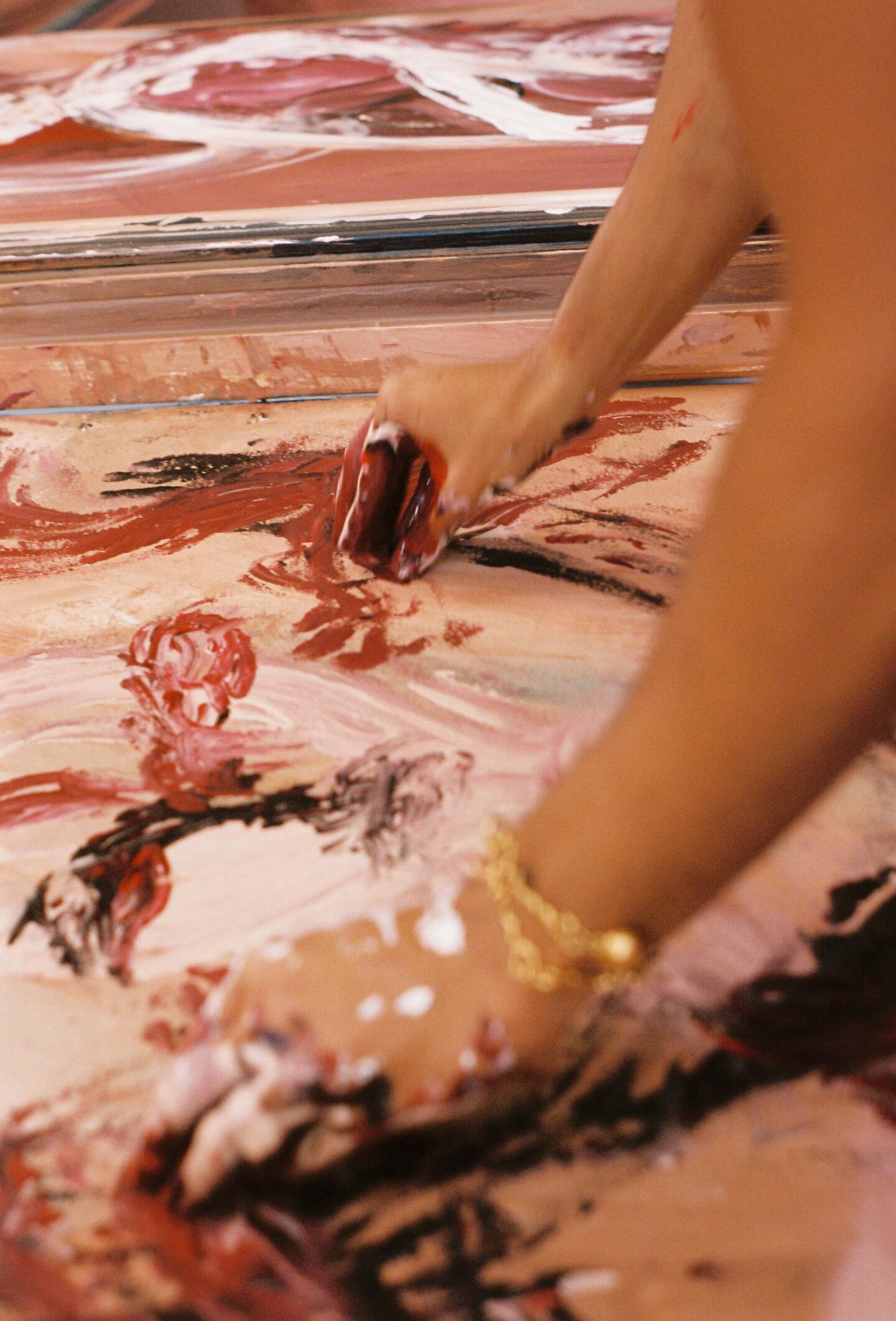Listen Now: Samuel de Saboia and Rosh Mahtani on Healing Through Making
Emerging painter Samuel de Saboia and Rosh Mahtani, founder of Alighieri Jewellery, discuss their collaboration during Frieze Los Angeles, ‘Armour of Light, Heart of Clay’
Emerging painter Samuel de Saboia and Rosh Mahtani, founder of Alighieri Jewellery, discuss their collaboration during Frieze Los Angeles, ‘Armour of Light, Heart of Clay’

Presented during Frieze Los Angeles 2022, the interdisciplinary exhibition 'Armour of Light, Heart of Clay’ was rooted in the familial histories and shared philosophies of Brazilian painter Samuel de Saboia and Rosh Mahtani, founder of Alighieri Jewellery. The three-day immersive presentation, featuring dynamic large-scale paintings by de Saboia alongside handmade carvings and personal artefacts, captured an exploration of the vital roles ritual and materiality play in storytelling.
Evolving their connection and concept through living and working together in the gallery space, Saboia and Mahtani’s describe the resulting works as ‘an exploration of healing through art’, integrating spiritual practices, site specific details and inspirational lore to map a parallel world accessed through creativity and craftsmanship.
A special event in collaboration with Frieze saw de Saboia and Mahtani extend their private dialogues into a public conversation with writer and editor Evan Moffitt, where the speakers expressed their desire, in de Saboia’s words, ‘ to make healing joyful and sexy again.’

“I think you set out as a creative to make things for yourself as a way of healing yourself, and that’s really beautiful, and you want people to see it and share in it. That’s all you long for in the beginning, and then people start to adopt it, and it starts to grow, which is a wonderful thing because it feels like… I imagine it feels like having a child that’s growing or maybe smiles at you for the first time, and all the hard work feels worth it. And then it becomes a toddler and it’s running around… You’ve got to send your kid to school, and you’ve got logistical issues and all of the joys of running a business and growing a brand. Somewhere along the way, it’s very easy to lose that sacred part of it. And it’s something that, for me, eight years in now, I’m trying to re-carve that time for myself. That’s why I put the candle in the centre of the room, to almost say to myself, okay, back to the candle, everything else need to quiet down.” – Rosh Mahtani

“When I go to do a painting or to do a sculpture, or thinking about a performance, I tend to see it already from the beginning, or I see some of the forms that I want to be there, or I just think about how I want this energy to be tactile. So, there are these moments of just imagining it, right in front of it, without adding a drawing, without adding colour. Just watching the raw material, and letting this material also tell me which place they want to go. It’s the thing that happened within these walls.” – Samuel de Saboia

“The physicality of working into the wax, and the tactile nature of it, and the way that it’s also really temporary. And that you can spend hours or days carving something, and then you go too close to the flame, and the whole thing can just disappear. And it’s quite a beautiful lesson in moderating yourself and seeing how far you want to go with something, but also letting the form take you. So, yes, it’s so much about the process, for me, and I think seeing you paint, it feels very similar.” – Rosh Mahtani

“I think within my work, within my life experience, within the conversations that we share, I care about making all of this on the now, about making this within the conversation that I’m having in this moment, and the conversation that I’ll make after this.” – Samuel de Saboia

“We were speaking about quite heavy things, right? Difficult things that you’ve been through, and painful things, but yet you leave with this joy. And I think that that’s such an interesting thing, that you can use those painful experiences when you find a likeminded person, and actually it doesn’t feel heavy, it feels liberating. By allowing that vulnerability to escape into a different form or a conversation, it leaves you feeling lighter, which is interesting.” – Rosh Mahtani

“The process of taking care of yourself is something that for, I would say some centuries now, has been denied to certain people. So the ways that these processes, for this group of people that were denied, usually worked was in magical terms or spiritual terms. And in terms of community. Self-care wasn’t only about you. Even taking care of someone next to you was taking care of yourself. And the ways that we would have this were in moments of celebration, in the moments that the cultures were together, that everyone was next to each other in the kitchen. And even this being together in the kitchen, and not being in terms of working in the kitchen, was something that changed, say, in the past 200 years.” – Samuel de Saboia
Rosh Mahtani founded Alighieri to guide her through a dark time, with each fragmented talisman is inspired by Dante Alighieri’s own story of being lost in a dark wood. Discover Alighieri’s range celebrating the beauty of human imperfection and vulnerability here .























